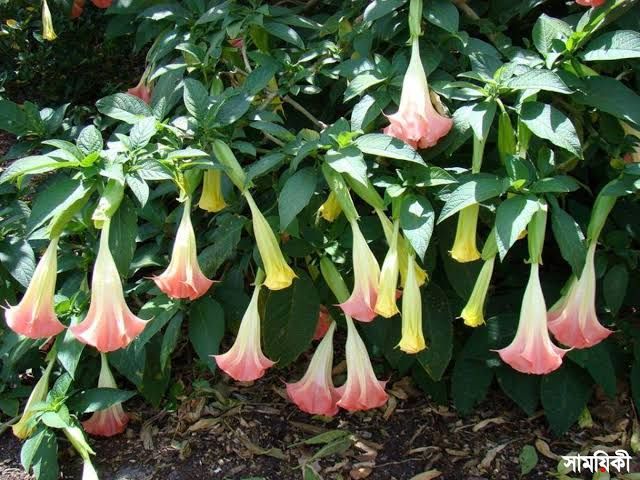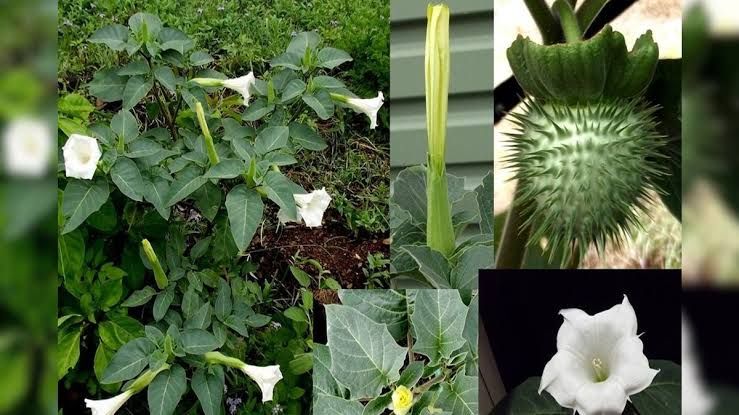
Bismillahir Rahmanir Raheem.
Assalamu Alaikum Wa Rahmatullahi Wa Barakatuhu.
Dear fellow friends, I hope you are all well, I am also well and healthy by the grace of Allah through your prayers. Welcome and congratulations to all of you in today's post.
Dhutura, commonly known as Datura, is a genus of nine species of poisonous vespertine flowering plants belonging to the family Solanaceae. The various species of Datura are known by several common names, including Jimsonweed, Devil's Trumpet, Moonflower, and Thornapple. The plant has been used for centuries in traditional medicine, particularly in Ayurvedic and Chinese medicine, due to its potent medicinal properties. However, it's important to note that all parts of the plant are highly toxic, and misuse can lead to severe poisoning or death.
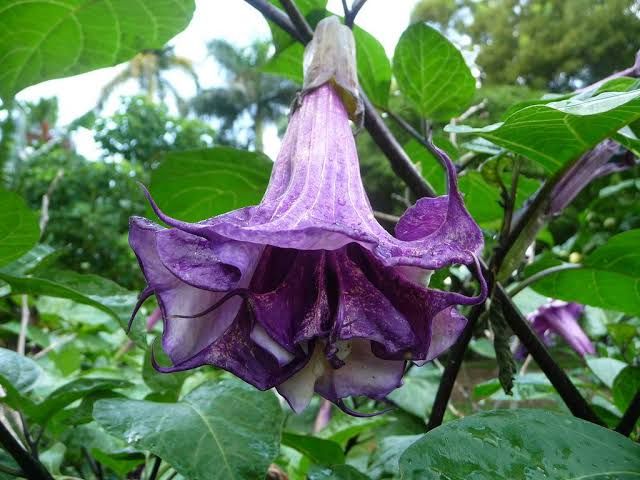
source
Suitable Environment for Dhutura Plant
Dhutura is a hardy plant that thrives in a variety of environments. It is typically found in temperate and tropical regions across the world, particularly in the Americas, Asia, and Europe. The plant prefers a sunny location and can often be found growing in disturbed soils such as roadsides, waste places, and cultivated fields.
Soil and Climate Requirements
Soil: Dhutura can grow in a wide range of soils, from sandy to clayey, but it prefers well-drained, fertile soils. It does not tolerate waterlogged conditions well and thrives in soil with a neutral to slightly acidic pH.
Climate: The plant flourishes in warm climates with temperatures ranging from 20°C to 30°C. It is drought-resistant and can survive in arid conditions, although it grows best with moderate watering.
Cultivation
Dhutura can be propagated from seeds. The seeds should be sown in early spring when the soil temperature has warmed up. The plant grows quickly and can reach maturity within a few months. Regular weeding and occasional watering are typically all that is needed to ensure healthy growth.
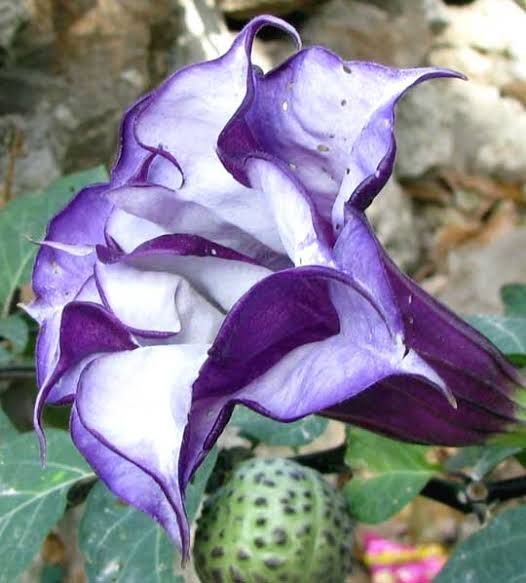
source
Medicinal Properties of Dhutura
The medicinal properties of Dhutura are primarily due to the presence of tropane alkaloids, such as atropine, scopolamine, and hyoscyamine. These compounds have potent anticholinergic properties, meaning they inhibit the action of the neurotransmitter acetylcholine in the central and peripheral nervous system.
Key Medicinal Compounds
Atropine: Used to dilate pupils, treat bradycardia (slow heart rate), and as an antidote for certain types of poisoning.
Scopolamine: Used to treat motion sickness and postoperative nausea and vomiting. It also has sedative and amnesic properties.
Hyoscyamine: Used to treat a variety of gastrointestinal disorders, including irritable bowel syndrome (IBS) and peptic ulcers. It also has antispasmodic properties.
Medicinal Uses of Dhutura
Despite its toxicity, Dhutura has been used in traditional medicine for various ailments. However, due to its potential for poisoning, its use should always be supervised by a qualified healthcare provider.
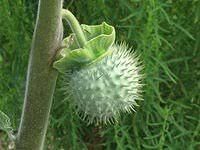
source
Respiratory Disorders
In traditional medicine, Dhutura has been used to treat asthma and chronic obstructive pulmonary disease (COPD). The anticholinergic properties of its alkaloids help to relax the bronchial muscles and open up the airways, making breathing easier.
Pain Relief
Dhutura has analgesic (pain-relieving) properties and has been used to treat various types of pain, including neuralgia and rheumatic pain. The plant’s extracts can be applied topically or taken internally in controlled doses to alleviate pain.
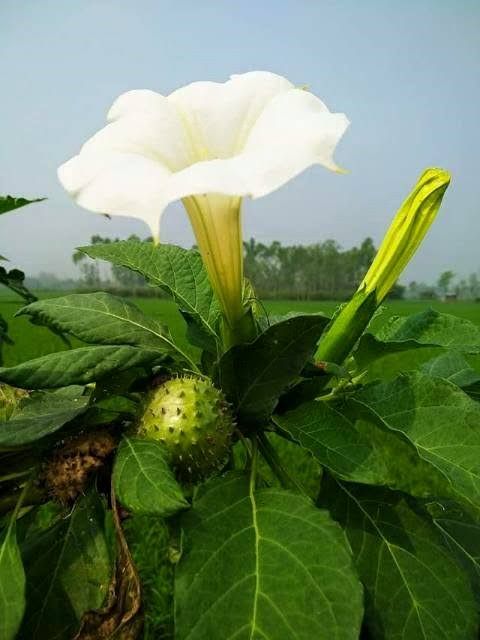
source
Gastrointestinal Disorders
Dhutura’s antispasmodic properties make it useful in treating gastrointestinal disorders such as irritable bowel syndrome (IBS), colic, and peptic ulcers. The alkaloids help to relax the smooth muscles of the gastrointestinal tract, reducing spasms and pain.
Neurological Conditions
Dhutura has been used to treat certain neurological conditions, such as Parkinson’s disease, due to its ability to inhibit acetylcholine. This can help to reduce symptoms such as tremors and muscle stiffness.
Skin Conditions
Topical applications of Dhutura extracts have been used to treat skin conditions such as wounds, ulcers, and inflammatory skin diseases. The plant’s antibacterial and anti-inflammatory properties aid in the healing process.
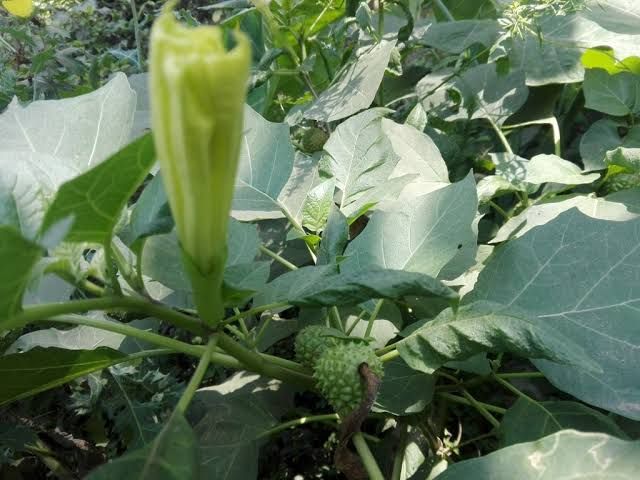
source
Motion Sickness and Nausea
Scopolamine, one of the key alkaloids in Dhutura, is commonly used to prevent motion sickness and to treat postoperative nausea and vomiting. It is available in the form of transdermal patches, tablets, and injections.
Traditional and Ritual Uses
In addition to its medicinal uses, Dhutura has a long history of use in traditional rituals and as a hallucinogenic. Various cultures have used the plant in religious ceremonies and for divination purposes. However, these uses come with significant risks due to the plant’s toxicity.
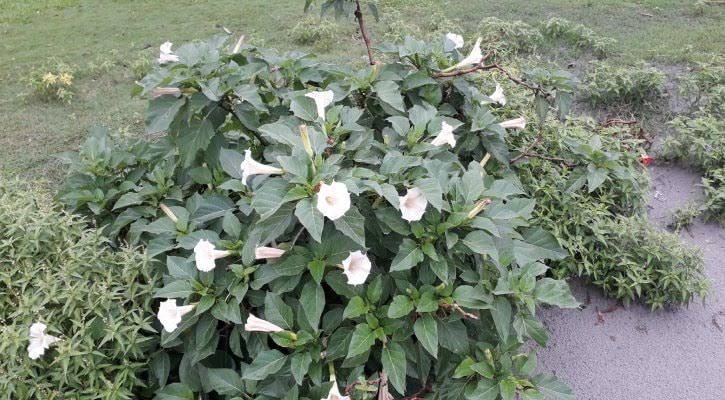
source
Safety and Toxicity
While Dhutura has various medicinal uses, it is crucial to emphasize that all parts of the plant are highly toxic. Ingestion or improper use can lead to severe poisoning, characterized by symptoms such as dry mouth, blurred vision, urinary retention, hallucinations, convulsions, and even death. The plant’s toxicity is primarily due to the high concentration of tropane alkaloids.
Symptoms of Dhutura Poisoning
Mild Poisoning: Dry mouth, thirst, difficulty swallowing, blurred vision, dilated pupils, confusion, and agitation.
Severe Poisoning: Hallucinations, delirium, seizures, respiratory depression, coma, and death.
Treatment for Poisoning
In cases of Dhutura poisoning, immediate medical attention is required. Treatment typically involves supportive care and the administration of activated charcoal to reduce the absorption of toxins. In severe cases, medications such as benzodiazepines may be used to control seizures, and intravenous fluids may be administered to maintain hydration.
source
Dhutura, or Datura, is a potent medicinal plant with a wide range of uses in traditional medicine. Its alkaloids, such as atropine, scopolamine, and hyoscyamine, provide significant therapeutic benefits, particularly for respiratory disorders, pain relief, gastrointestinal issues, and neurological conditions. However, the plant’s high toxicity necessitates careful and controlled use under the guidance of a qualified healthcare provider. The suitable environment for growing Dhutura includes well-drained, fertile soil and a warm climate, making it a hardy plant that can thrive in various regions around the world. While Dhutura holds great potential in the realm of herbal medicine, its toxic nature underscores the importance of caution and respect when utilizing this powerful plant.
